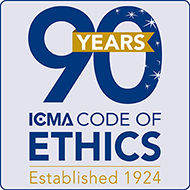
Writing about the adoption of the ICMA Code of Ethics, former ICMA President Revan Tranter set the stage. “The year was 1924. Lindburgh had yet to make his transatlantic flight. Churchill, in one of his wilderness periods, had just been defeated for a Parliamentary seat. The Australian Parliament had yet to move from Melbourne to Canberra, the new capital.
Canada wasn’t yet complete: Newfoundland was still a British colony. Hitler was in his jail cell writing Mein Kampf. Coolidge was president of the United States. Babe Ruth was in his element. And Perry Cookingham was yet to begin his career as a city manager. It was as they say, a different era, when ICMA’s original Code of Ethics was published.
Today's era is different as well. We are strong and thriving with much of what Tranter noted was missing from the profession in 1924: assistants, county administrators, COG directors, international members beyond North America, consultants, women, and minorities.
A truly global profession now must address the shared challenges of the accelerating pace of technological innovation and its impact on society; building sustainable communities and organizations on an economic, environmental, and equity front; sweeping demographic changes; and evolving public expectations of the role of local government.
Challenges and times do vary, but the profession has enjoyed one common thread over the years: its commitment to principle-centered leadership in order to build trust with the public being served.
ICMA in 1924
The 13 articles of the first Code of Ethics poured the foundation for a new profession. Presented at the ICMA conference in Montreal, Quebec, Canada, in 1924, the Code reinforced the obligation of the “city manager” to serve the community without discrimination; promote the council-manager plan; support the council as a whole and not play an active role in politics; give credit to the council for policy decisions; avoid leveraging the office for personal gain; and demonstrate exemplary personal conduct.
The Code ended with a call that reflects the Athenian Oath: “A city manager will be known by his works, many of which may outlast him, and regardless of personal popularity or unpopularity, he should not curry favor or temporize but should in a far-sighted way aim to benefit the community of today and of posterity.”
Throughout the decades, ICMA has engaged the membership in an ongoing dialogue to ensure that the Code remains relevant to the profession. The membership has approved changes to the tenets on only seven occasions. Here are the highlights of those changes:
1938. In the first amendment, a preamble was added to better explain the council-manager structure and ICMA’s mission. Also added was a statement of the profession’s commitment to merit-based hiring, noting that “political, religious, and racial considerations” carry no weight in personnel decisions. Interestingly, reference to the manager’s duty to stay out of politics disappeared from the Code.
Article 3, while updated over the years, remains virtually intact today: “The city manager is governed by the highest ideals of honor and integrity in all his public and personal relationships in order that he may merit the respect and inspire the confidence of the administrative organization which he directs and of the public which he serves.”
1952. The eternal debate over the precise role of the manager in the policy arena was reflected in tweaks made to the policy-related articles. Sagely, the Code advised managers that they should avoid coming in public conflict with council on controversial issues.
The first reference to an ongoing duty to continuous professional development also appears in 1952.
1969. As membership expanded as the result of changes to the ICMA Constitution, the Code ceased using the term “city manager” in exchange for the more inclusive reference to “member.”
1972. The profession’s commitment to political neutrality, dropped in the 1938 revision, reappears in more direct language in a new Tenet 7: “Refrain from participation in the election of the members of his employing legislative body, and from all partisan political activities which would impair his performance as a professional administrator.”
For the first time, guidelines adopted by the ICMA Executive Board were added to give members practical advice on investments, gifts, job commitment expectations, and election activities. In addition, the ICMA Executive Board adopted formal rules of procedure.
1976. As ultimately unsuccessful efforts were underway to ratify the Equal Rights Amendment to the U.S. Constitution, the Code was made gender neutral in recognition of the fact that women were truly part of the profession.
1998. An increase in political activity by members led the charge to amend the profession’s commitment to political neutrality in Tenet 7 by emphasizing the broader principle. The new version stated: “Refrain from all political activities which undermine public confidence in professional administrators. Refrain from participation in the election of the members of the employing legislative body.”
The board also revised guidelines to provide more advice about election campaign activities that should be avoided.
Ethics Are Fundamental
ICMA continues to engage members in the dialogue about the relevancy of the Code. In 2013, a formal review of the entire Code was initiated beginning with Tenet 7 and the related guidelines on political neutrality.
The ICMA Executive Board voted to retain the existing language in Tenet 7; retain the prohibition on running for elected office or engaging in campaigns; and add a new guideline on personal issue advocacy. The dialogue on Tenet 12 (seek no favor) continues.
As the profession looks to the challenges of the next 100 years, consider the observation of ICMA President Simon Farbrother: “How we lead defines our effectiveness as city and county managers. How we lead is underscored by our ICMA Code of Ethics. The fact that we lead in an ethical manner ensures we help build great communities. Ethics are fundamental to our profession.”
New, Reduced Membership Dues
A new, reduced dues rate is available for CAOs/ACAOs, along with additional discounts for those in smaller communities, has been implemented. Learn more and be sure to join or renew today!
